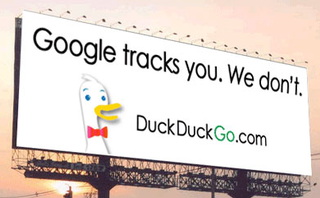I’ve read a few articles recently how people are using search engines that track you less than Google in light of the spying. I’ve been using DuckDuckGo for a while since I find Google so spooky. Nobody is challenging in Google’s dominance, but competition is increasing.
Its search results aren’t as good as Google’s, but I prefer it, as I’ll explain.

Nearly every successful company has a strategy or it will lose focus and fail. Same with people, for that matter. Whatever a company or person says, if you know their strategy you can predict their behavior. Usually if you know their behavior you can figure out their strategy.
In the case of Google and your privacy, I believe their strategy says a lot about them. I wrote the following on a forum about people switching.
Google’s strategy is to profit from advertising. It fundamentally benefits from knowing as much about its users as possible. Every tactic it has will always support that strategy or it will risk failure.
You can tell its strategy motivates it toward evil (its term, not mine), because its slogan is “Don’t be evil.”
It chose that slogan because it risks being evil, in its terms. It doesn’t need a slogan like “Don’t be unprofitable” or “Don’t break the law” because its strategy doesn’t point it in those directions. It points to being, in its term, evil.
Why else would a company feel so compelled to stop itself from doing evil than to make its most prominent slogan to stop itself? If its strategy didn’t point it in that direction, why else would it try to stop itself? All the brilliance of its engineers, managers, leaders, deals, and so on exists to support the company’s strategy, which it realizes motivates them so much toward evil it has to stop itself as its highest or at least most public directive.
“Don’t be evil” exists to make the place palatable to humans who understand the company’s direction. Who chose the slogan to represent the company? The people who know the company’s direction best. They know it better than you and they realize its direction.
Google has a technically superior product to its competitors. When you realize its most knowledgeable and powerful employees know its strategy points it to “be evil”, you realize why people use alternatives whose strategies don’t point them to evil, especially when current events highlight the consequences of its strategic choice of knowing so much about you, its users.

I use https://startpage.com/ for searching the web. Startpage.com gets its results from Google but does not exchange any information about you with Google, nor does it store any information about your searches on its own servers. The benefiit of not exchanging information with Google is that you get *real* search results, not personalized results. An extra bonus of startpage.com is the option to get a web page from the search results anominously via a proxy that startpage.com provides.
BTW. It’s a common misunderstanding that the “Don’t be evil” slogan is directed to the company. It’s not! It is directed to its users (Eric Schmidt has a twisted kind of humor and laughts himself silly about this).
Thanks for the tip. I used Scroogle until it got shut down, which seemed similar. Now I can use the ‘s’ key as a keyword for my searches again.
I forgot that avoiding the bubble effect is another reason I don’t like search companies using my information.